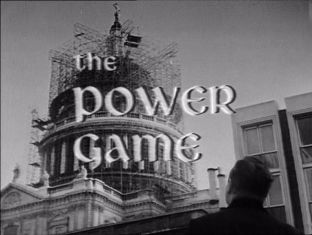

Monday 19 December 1966
”There’s No Such Thing as a Dead Heat” Writer Edmund Ward Director Rex Firkin.
“You don’t warn people like me, Caswell. I’ve had two days” Sir John Wilder.
Charles Grainger (Robin Bailey) urges Susan Weldon (Rosemary Leach) to apply for a transfer to the Treasury. The next day the Minister meets Caswell Bligh (Clifford Evans) to tell him the National Export Board is being wound up. Grainger tells both Susan and Bligh that Wilder has known for a year that they were wasting their time at the NEB . Caswell returns to Bligh Construction, taking over the office of Ken Bligh (Peter Barkworth). Caswell decides to cancel several sub-contracts that Ken and Don Henderson (Jack Watling) have arranged. Furious, Ken decides to sell his shares in Bligh Construction and go into business with Don. With his vision of a family dynasty threatened, Caswell visits Sir Gordon Revidge (Norman Tyrell) offering to sell his 55% stake in Bligh Construction to Elberdson’s Merchant Bank on condition that Wilder is sacked from both Bligh’s and the bank.
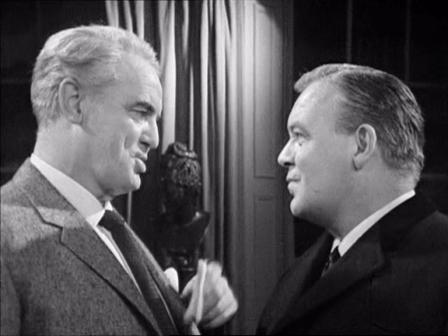
Suggesting Pamela Wilder (Barbara Murray) ensure her finances are secure, Charles Grainger (Robin Bailey) intimates that her husband is about to have a reversal of fortune, “I don’t dislike John. I just dislike the fact that he should happen to be married to you.” In the previous episode, Grainger had hoped to negotiate the break-up of the Wilder marriage, only to be ejected from Wilder’s office and then witness a reconciliation. Now he takes gratuitous revenge. In the first episode of this series, Grainger had advised Wilder to refuse the chair of the National Export Board, telling him that “long term plans called for the NEB to be discretely and quietly absorbed by other bodies”. Wilder had agreed to leave the NEB to Caswell Bligh with the words, “Who do we know who wants to buy a dead horse”.
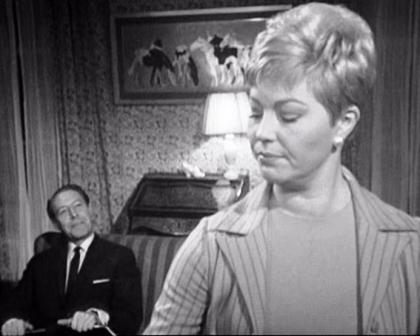
Rosemary Leach conveys uncertainty, outrage and a little self interest during Robin Bailey's visit
Grainger quotes those words back to Susan Weldon after counselling her to “show a vote of tacit no confidence” in the NEB by applying for a transfer. When Susan defends some of the proposals in the report which Caswell is preparing for the Minister (“It’s not utopian. It needs to be done.”), Grainger benevolently corrects her. “You sound like a voter, Miss Weldon, confusing the smokescreen of recommendation with the feasible path of action.
When Susan asks why Grainger should offer her the first lifeboat off the sinking ship, he echoes the words of Colin Townley in the first series, telling her they represent “Four centuries of unostentatious power. We can squash the freebooters – the Wilders and the Blighs – without ever moving from our drab chairs. The politicians and the tycoons have all the trappings, of course. Expensive offices, gaudy speeches. We have the power. Trappings are nothing. A mere ritual puppet dance. We hold the strings. You have a chance to tighten your grip.”
Ward presents a view of a consistent, all-powerful Civil Service which would be popularised in the 1980’s with the BBC’s “Yes Minister” . However, Grainger is twisting that power to his own ends. Having advised Susan Weldon to save herself, he makes it clear that John Wilder had let her waste a year of her life trying to advance in a doomed department.
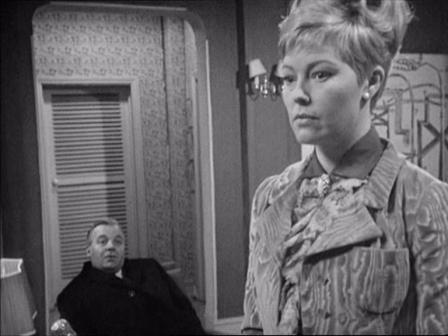
Rosemary Leach finally gets to wear some Swinging London gear for her final outraged rendezvous with Patrick Wymark
With the relationship between Weldon and Wilder effectively written off in the previous episode, Ward provides a comic coda. With Wilder invited to Susan’s flat, where an iced bucket of champagne waits, Wilder condescendingly assumes that she’s finished with her “lackey in the Auditor General’s Department”. Rosemary Leach seethes quietly before letting rip about the way he’s used her over the NEB. The scene ends with Leach throwing a glass of champagne over Wymark, who does an Oliver Hardy slow burn while reaching out and drinking down the second glass.
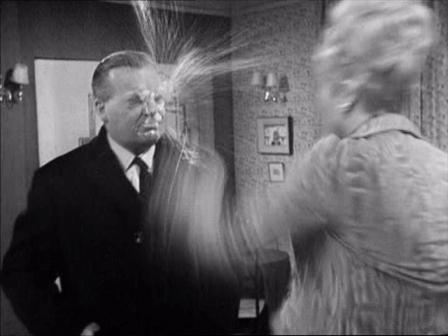
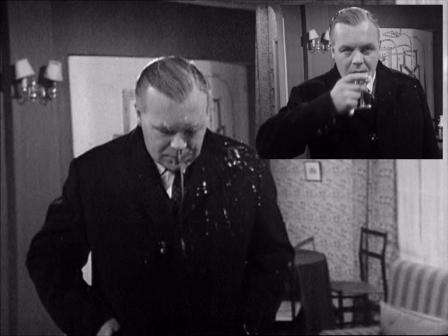
The meeting where Caswell Bligh expects to present his report to the Minister is painful because we know from the start that the NEB is finished. Once again there’s a sense of the Treasury steering events, with Grainger explaining the facts while the Minister (Gerald Case) speaks only to offer Bligh the prospect of “tangible recognition in the near future.” As the Minister and his aide depart for their next meeting, Grainger innocently adds that Wilder knew the NEB was doomed. Bligh has seen his ambitions shattered and Grainger has given him a scapegoat.
Caswell returns to Bligh Construction the next morning, issuing orders, commandeering Ken’s office, and telling Wilder that he intends to get him out; “Nobody sells me shoddy goods.”. While Wilder is away in Rome, Caswell begins reorganising the company.
Although Don Henderson (Jack Watling) has become disillusioned with Wilder during this series, he demonstrates one final act of loyalty. He meets Wilder at the airport to warn him that he’s written a letter of resignation. “Caswell’s playing Hitler and I’m a sort of voluntary Sudetenland.” Wilder reads the implication that he’s next and quietly,sincerely thanks Don before watching him walk away.
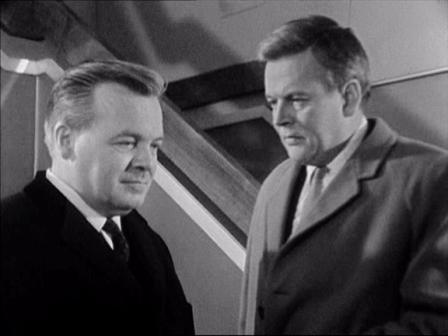
Right at the start of the first series, Wilder had warned Bligh that one day Ken would cut his throat to get control of the company. Wilder is proven wrong, but the Bligh family is torn apart by Caswell’s return. With Clifford Evans barnstorming as Bligh, dictating an evening meeting at Ken’s home and rubbishing his achievements, the quieter, neurotic Peter Barkworth finds an escape route, using the 15% shares left to him by his mother to fund the purchase of a redriven piling company that he and Don will run. Rachel Herbert, who has always presented an ambiguous portrayal of Ken’s smug but nurturing wife Justine, underlines the sense of disaster as she relates her trip with Caswell to set up a Trust Fund for his grandchildren and her final sight of him along on the pavement.
The return of Norman Tyrrell as Sir Gordon Revidge gives a true sense of closure to this episode, even though Revidge is now just a participant, rather than an active conspirator in Wilder’s downfall. With Bligh offering to sell his company to the bank on condition that Wilder is fired, Revidge must feel that all his Chirstmas’s have come at once.
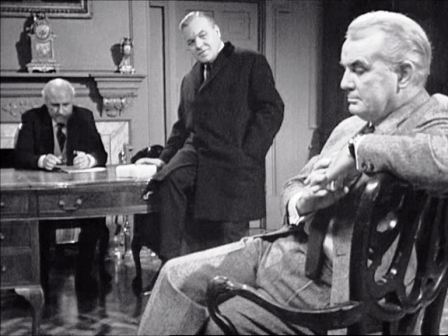
But as Wilder tells Bligh “You don’t warn people like me.” Wilder has flown to Rome to alert the Consortium that Caswell is taking control. Wilder advises Revidge that there’s a “Change of Management” clause in the contract with the consortium. Alluding to Bligh’s beginnings in a stone quarry, he says that with Ken, Don and Wilder gone, the Consortium “Don’t know Caswell from an old man peddling tombstones.” Bligh’s is out of the Consortium, and Wilder has negotiated a new partnership with a German company for a £100,000 negotiating fee. This ensures revenge on two fronts because the Treasury has committed foreign capital to the Italian venture and with Bligh’s now out of the picture, Charles Grainger is going to have to explain the wasted money.
Wilder also reveals that he has a seven day option on Ken’s shares (in exchange, Ken and Don’s new company gets two year’s back-dated contracts with Bligh Construction). If Sir Gordon won’t buy the option for £150,000, Wilder threatens to sell it to Infells, giving 15% of Bligh’s to its biggest competitor.
Revidge sees it’s not a bluff and agrees to buy. In return, Wilder resigns from both Bligh’s and the bank. “You’re an arrogant, destructive old man, Caswell” Wilder says in farewell. “Wrap it up how you like, “Caswell replies, “You lost”
”But with enough money to soak up most of the blood.”
As in the final episode of “The Plane Makers”, Wilder perceives that the situation is against him and picks up some pieces from the wreckage.
Pamela is now reconciled to Wilder, and although she heeds Grainger’s warnings, she liquidates some of her assets and offers to finance Wilder’s fight against Bligh. He in turn declines: “No golden apron strings. Just me and Caswell.”
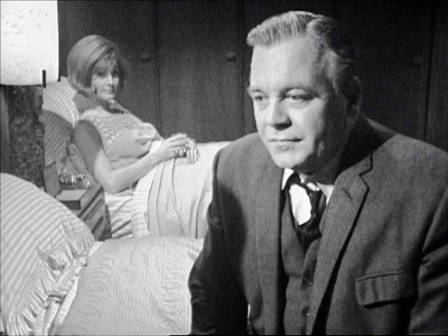
It’s good to see Miss Lingard (Norma Ronald) one last time, interrupting Wilder’s lunch appointment with Pamela to pass on two urgent messages.
Barbara Murray has been sporting increasingly eccentric headgear in the past few episodes and Wilder comments in one scene, “That’s a very peculiar hat. Did your mother leave it behind?”
Ken Bligh comments in this episode that Wilder tends to win the contracts while he and Don run the projects. Most of the “Power Game” episodes have been about winning contracts, and this is one of the few episodes to give an insight into day-to-day operations. When Wilder objects to their proposal for a redriven piling sub-contract on the grounds of cost, Ken observes that it’s “One of the fragments of technical knowledge he picked up somewhere and trots out like a proverb.”
This final episode confirms that the second series of “The Power Game” has accounted for twelve months of Wilder’s life. With Wilder out of both Bligh Construction and Elberdson’s merchant bank, and Don off in partnership with Ken, there is a real sense of finality.